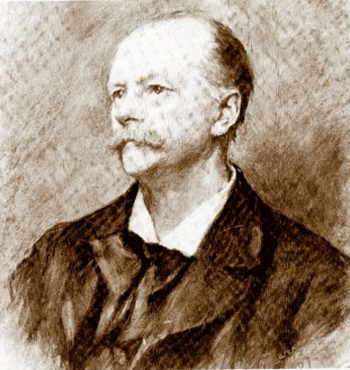Henri Duparc was born in Paris in 1848 into a wealthy, aristocratic
family. He studied piano, and later composition, with César Franck; his
earliest compositions, dating from the 1860s, include Six reveries
and Feuilles volantes for piano, and a sonata for cello and
piano. But in 1885, aged just 37 years old and with a burgeoning career as
a successful song-writer ahead of him, Duparc stopped composing. Always
highly sensitive and nervous, mental illness which was diagnosed as
neurasthenia was accompanied by increasing vision loss, eventually leading
to total blindness.
Ever the perfectionist, in later years Duparc destroyed most of his
music, leaving few works to posterity; but his seventeen extant songs
epitomise the qualities of mélodie: clarity and intensity of
expression, diversity of mood, and sophisticated, cultivated union of
music and word. Mezzo soprano Sarah Connolly and baritone Hank Neven
performed a programme devised by pianist Malcolm Martineau, taking us on a
chronological journey through the songs which assured Duparc’s immortality
and revealing the astonishing talent which was so sadly curtailed.
Connolly’s sumptuous tone and lyricism are ideally suited to the
expressive richness of these songs. In the earliest of them, ‘Chanson
Triste’, the gentle, well-shaped melody, reminiscent of Gounod, rested
calmly on the warm ripples of the accompaniment, as the poet-speaker
bathes in memories of his departed beloved. The voice brightened with a
joyful outburst of hope that his inner peace might be restored by such
ruminations, and this thread of light suffused the tranquil piano
postlude.
‘Romance de Mignon’ was originally suppressed by Duparc as falling short
of his exacting standards; it is fairly unsophisticated in terms of its
expressive chromaticism but the dark dissonances and the wide expanse of
the accompaniment contribute to an operatic rhetoric which Connolly and
Martineau dramatically exploited.
‘Au pays où se fait la guerre’ pays melodic homage to Schubert’s ‘Der
Erlkönig’. From the ringing opening motif to the angry growl of the final
stanza, Martineau’s ever-changing, often strikingly contrapuntal
accompaniment lines and textures, created precise moods complementing the
word-painting in the vocal line. The song is thought to have been derived
from material for a discarded opera; Connolly certainly revealed the range
of emotions present in Théophile Gautier’s text, from ecstasy to despair.
The growing intensity and sophistication of Duparc’s language and form was
evident in ‘L’invitation au voyage’, a setting from Baudelaire’s Fleur
du mal, which was composed while the composer was serving in the
garrison during the Prussian siege in the winter of 1870—71. The
performers masterfully crafted the whole, creating urgent movement
forwards; the calm composure of the vision of the loved one’s eyes where
dwell ‘order et beauté/ Luxe, calme et volupté’ (order and beauty/
abundance, calm and sensuous delight), subsequently exploded in glittering
piano cascades, voice and accompaniment luminous and impassioned.
Connolly opened the second half of the recital with ‘Élégie’ and
‘Extase’ (Rapture), both of which have a Wagnerian flavour. The boldness
and colour of Martineau’s accompaniment brought depth of character to the
former, while the latter was particularly exquisite, a delicate unfolding
of profound emotion. ‘Lamento’, another Gautier setting and dedicated to
Fauré, possessed a charming, easy grace; here, Connolly made much of the
words, sensitive to Duparc’s sometimes unusual verbal emphases. The mezzo
soprano’s gorgeous lower register brought dramatic intensity to
‘Testament’, overcoming the flimsiness of Armand Silvestre’s text.
Unfortunately, baritone Hank Neven could not quite match Connolly’s
refinement of technique or interpretation, finding it a challenge to
capture Duparc’s expressive register — with its fusion of raw passion and
elegant finesse — or the mélodie’s majestic sweep. While the
dying final line of ‘Soupir’ (Sigh) was wonderfully tender, the weaknesses
in Neven’s pronunciation marred the overall effect, for the expressive
ambience depends considerably upon the French-specific features such as
elision. ‘Sérénade’ was less tentative, the melodic arcs more robust, but
as in ‘Le galop’, with its agitated pounding accompaniment and vigorous
vocal line, it all felt a little heavy-handed, and there were some
problems with intonation, particularly at the top.
Neven seemed more comfortable with the bold forthrightness of ‘La vague
et la cloche’ (The wave and the bell); the low unison of voice and
accompaniment — ‘Puis, tout changea … la mer et sa noire mêlée/
Sombrèrent’ (Then everything changed. The sea and its black tumult
subsided’) — was chillingly ominous, and above Martineau’s tolling
ostinato, the baritone assumed a convincing declamatory mode. And, in the
second half ‘Sérénade’ florentine’ and ‘Phidylé’ were also more
successful, the former especially lyrical and stylish, its gentle
sentiments far from the violence and suffering of many of the other songs.
‘Phidylé’ is perhaps Duparc’s greatest song, and Neven and Martineau’s
wonderfully unhurried gradation was enchanting, the piano’s tranquil
postlude particularly beautiful. The first half of the evening had ending
with Duparc’s rarely sung duet, ‘La fuite’ (Escape), providing an
opportunity for the singers to tap their operatic vein; but Neven closed
the recital alone, with a sensitive rendition
of the composer’s final song, ‘La vie antérieure’ (A previous life),
quietly capturing Baudelaire’s yearning and nostalgia.
This was an evening of great interest and delight. The performers
consummately confirmed Duparc’s own description of his songs: ‘they come
from the heart and speak to the heart’.
Claire Seymour
Performers and programme:
Sarah Connolly, mezzo soprano; Hank Neven, baritone; Malcolm Martineau,
piano. Wigmore Hall, London, Wednesday 23rd April 2014.
Duparc: ‘Chanson Triste’, ‘Soupir’, ‘Romance de Mignon’, ‘Sérénade’, ‘Le
galop’, ‘Au pays où se fait la guerre’, ‘L’invitation au voyage’, ‘La
vague et la cloche’, ‘La fuite’, ‘Élégie’, ‘Extase’, ‘Le manoir de
Rosemonde’, ‘Sérénade’ florentine’, ‘Phidylé’, ‘Lamento’, ‘Testament’, ‘La
vie antérieure’.
